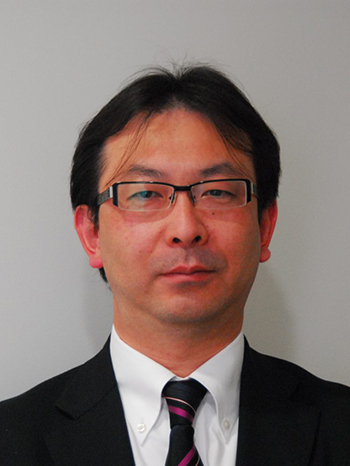Psychology Course/Welfare Course
In today’s modern society which is becoming increasingly complex, our mental and physical burdens are diversified and professional support tailored to individual needs is required. This department fosters women who acquire expertise from the aspects of psychology and welfare and play active roles in various scenes to support people to live authentically according to their individual circumstances.
Our Philosophy/Policy
Education and Research Purpose
The Department of Psychology and Social Work aims to foster human resources, based on the Christian doctrine of love that is our education philosophy, who acquire abilities to appreciate the dignity and values of all human beings, scientifically understand human psychology, deeply explore human welfare and seek self-actualization and contribute to society with their specialties in various fields such as medicine, welfare and education.
Message from Department Chairman
Learning psychology and social welfare and pursuing the realization of people's happiness
In the Department of Psychology and Social Work, students study two academic disciplines, psychology and social welfare, and make efforts toward the realization of people's happiness. To that end, students have to study many things, for example, theories, societies and systems, sciences, technologies, etc. and through such learning, students can acquire solid knowledge and practical skills. Furthermore, the learning will lead to the acquisition of professional qualifications such as those of Certified Public Psychologist, Social Worker and Psychiatric Social Worker.
This department provides an environment for learning through small-group and carefully-planned classes, education through seminars and practical training with importance placed on practice and various supports outside of class, and our teaching staffs who have honed their skills in the psychology and social welfare fields are waiting for you. I hope that in the Department of Psychology and Social Work, students will acquire abilities to realize people's happy future as professionals or in various sites in society such as companies and home. Through this 4-year study experience and campus life, we encourage you to take one step forward toward a happy future!

Points of learning
We have implemented small-group teaching with importance placed on dialogues.
For seminars that are given to students from the first to fourth year, we have prepared a system where in one class consisting of about 10 students, the students and a professor learn together from entrance until graduation.Students acquire practical skills through experiences at actual sites from the first year
We offer various subjects for practical training and exercises to students from the first year, and students can improve their professional abilities and practical skills while experiencing real situations at actual sites.We have prepared many supports so that students can open up their future.
We widely support students according to their individual career plans by offering preparation programs for national examinations to obtain qualifications and examination for graduate school in addition to regular classes.
Introduction of Courses

Psychology Course
We offer a curriculum necessary to obtain the qualification of Certified Psychologist from the Japanese Psychological Association and the qualification to take an examination for the national qualification of Certified Public Psychologist. Students learn to understand others scientifically by collecting and analyzing data on people's “mind,” which is an abstract subject, through experiments and exercises. Students also learn the methods for psychological assessment, etc. to acquire abilities that can be used not only in the welfare and medical fields, but also in general companies.

Welfare Course
We offer a curriculum with lectures, exercises and practical training being organically combined and foster welfare professionals who can play active roles at actual sites and human resources who can use their expertise in various scenes in society. Students can obtain the qualifications to take the national examinations of Social Worker and Psychiatric Social Worker. Students aim to acquire specialized knowledge and skills related to welfare necessary to solve various problems such as abuse, bullying, poverty and the increase in dementia cases among elderly people.
Policy for admission of new students
(1)Students sought by the Department of Psychology and Social Work
- We seek students who have basic academic abilities in major subjects in high school and are strongly committed to developing and applying such abilities to understand people.
- We seek students who are committed to contributing to society through connections between people based on the wealth of the human spirit.
- We seek students who have a deep interest in people and are committed to contributing to society through the pursuit of truth and learning.
(2)High school study requirements (learning goals in high school)
- Knowledge at the high-school graduate level
- High-level Integrated Japanese Language
Policy on organizing and implementing curricula
In order to achieve the Diploma Policy of the Department of Psychology and Social Work, specialized subjects include "core subjects," "core subjects," and "boundary subjects." Based on solid learning of basic knowledge and skills, the curriculum is designed to further deepen and develop applied and advanced content and to enable students to acquire specialized knowledge and skills in human understanding and support based on psychology and social welfare studies.
General Purpose Knowledge and Skills
General courses of the department
■Content
As basic education subjects common to all departments, there will be required courses for the acquisition of basic literacy, including group work.
As core and boundary subjects common to all departments, communication subjects and recreation subjects will be offered as elective subjects.
■Method
Courses will be offered mainly in the form of exercises, but also in the form of lectures, and will actively use active learning.
■Evaluation
The level of achievement is determined in a multidimensional and comprehensive manner based on participation and deliverables for exercises, and by written examinations, reports, and participation for lectures, in line with the learning objectives.
Psychology Course
■Content
As the core courses of the psychology course, there will be compulsory and elective courses to learn the ideas and methods for scientific human understanding.
■Method
Courses will be offered mainly in the form of practical training and exercises, and lectures will also include exercises as appropriate.
■Evaluation
The level of achievement will be determined in a multidimensional and comprehensive manner in line with the learning objectives by written examinations, reports, level of participation, content of presentations, etc.
Welfare Course/General
■Content
As the core subjects of the welfare course, there will be elective compulsory subjects to study "Institutions and Policies" and "Understanding the Subject" as the foundation of social welfare studies.
As boundary courses of the welfare course, elective courses on international welfare, including fieldwork, are offered.
■Method
Courses will be offered in an appropriate class format of lectures, exercises, and practical training, and will be combined with active learning as appropriate.
■Evaluation
For lectures, the level of achievement will be determined by written examinations, reports, participation, etc., in a multidimensional and comprehensive manner in line with the learning objectives. For exercises and practical training, the level of achievement will be determined by written examinations, reports, participation, and the content of presentations in a multidimensional and comprehensive manner in line with the learning objectives.
Specialized knowledge and skills
Psychology Course
■Content
As the core courses of the psychology course, elective compulsory courses in specialized fields of psychology such as physiological, perceptual-cognitive, social, developmental-educational, clinical, etc. will be offered.
As the core courses of the psychology course, elective courses for the acquisition of Certified Psychologist will be offered.
■Method
Courses will be offered in an appropriate class format of lectures, exercises, and practical training, and will be combined with active learning as appropriate.
■Evaluation
For lectures, the level of achievement will be determined by written examinations, reports, participation, etc., in a multidimensional and comprehensive manner in line with the learning objectives. For exercises and practical training, the level of achievement will be determined by written examinations, reports, participation, and the content of presentations in a multidimensional and comprehensive manner in line with the learning objectives.
Welfare Course/Specialized
■Content
As the core subjects of the welfare course, elective subjects to cultivate the expertise required to become a social worker or mental health worker will be established.
As the boundary subjects of the welfare course, elective courses to study professional collaboration are offered.
■Method
Focuses on the form of teaching exercises and practical training.
■Evaluation
The level of achievement will be determined in a multidimensional and comprehensive manner in line with the learning objectives based on reports, participation, and the content of presentations.
Attitude/Intentionality
Common
■Content
As core courses common to all departments, there will be required courses that provide an introduction to psychology and social work.
Boundary subjects include elective courses to acquire field training and research methods for cross-cultural understanding.
■Method
Courses will be offered in the form of lectures or exercises, combined with active learning as appropriate.
■Evaluation
For lectures, the level of achievement will be determined in a multidimensional and comprehensive manner in line with the learning objectives by means of written examinations, reports, and participation.
Integrated learning experiences and creative thinking skills
General courses of the department
■Content
The seminar and graduation research courses are required as core subjects common to all departments.
■Method
Courses will be offered in the form of seminars, and individual guidance will be included for graduation research.
■Evaluation
The level of achievement is determined based on the level of participation and commitment in the exercises and the graduation research products.
Policy on Graduation Approval and Degree Conferment
DP1: Integrative Learning Experiences and the Ability to Think Creatively
Students shall acquire the ability to solve issues related to human beings and society, create a better future, and use their expertise in psychology and welfare based on their interest in and understanding of human beings and society. (Common subjects of the department)
- Interest in and understanding of human beings and society.
- Ability to solve issues related to human beings and society.
- Creativity to shape the future.
DP2: Generic Knowledge and Skills
Students shall acquire the ability to develop their own capabilities and collaborate with others through interaction. (Common subjects of the department)
- Ability to harness their own power.
- Ability to coordinate and collaborate with others.
DP3: Attitude/Intentionality
Students shall understand various value systems, have an objective attitude, and give ethical consideration to others through the study of psychology and social welfare. (Common subjects of the department)
- Understanding of various value systems.
- Objective attitude.
- Ethical consideration.
DP4: Specialized Knowledge and Skills
Students shall acquire knowledge to scientifically understand the workings of the human mind and behavior from various psychological viewpoints, such as physiological, cognitive, and social perspectives. They should be able to apply this knowledge to solve various problems in modern society. (Psychology Course)
- Specialized knowledge in various fields of psychology.
- Various viewpoints in psychology.
- Ability to apply psychological knowledge.
DP5: Generic Knowledge and Skills
Students shall learn scientific research methods and interpretation skills to understand the human mind. They should be able to appropriately report or discuss research findings. (Psychology Course)
- Basic scientific research methods.
- Statistical skills.
- Ability to summarize in a report.
- Scientific presentation/communication skills.
DP6: Generic Knowledge and Skills
Students shall acquire comprehensive knowledge, logical thinking, and consideration skills related to social welfare, which are necessary for social stability and personal happiness. (Welfare Course/General)
- Comprehensive knowledge of social welfare.
- Basic knowledge of quantitative research methods and qualitative research methods.
- Ability to make presentations and write theses.
DP7: Specialized Knowledge and Skills
Students shall acquire the attitudes and abilities to practice micro, meso, and macro levels of social work based on specialized knowledge in social welfare studies. (Welfare Course/Specialize)
- Comprehensive understanding and acquisition of specialized knowledge related to social welfare studies.
- Comprehensive understanding (theory, skills, and values) and the ability to put them into practice in social work.


